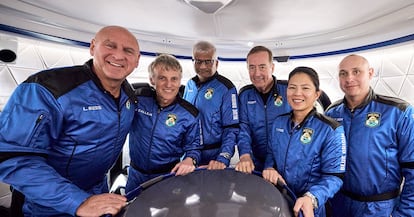Is Jesús Calleja becoming the third Spanish astronaut?


Who can be called an astronaut? We imagine a person in a white suit and shiny helmet in a spaceship and the answer seems simple. But with the arrival of the second space race and low-cost flights promoted by private companies, the answer becomes more complicated. This afternoon , the mountaineer and presenter Jesús Calleja will board one of Jeff Bezos's ships and, if everything goes according to plan, he will reach 100 kilometres in height. Is it a space flight? Does he become an astronaut by doing so?
Calleja will board a New Shepard spacecraft, from the company Blue Origin (owned by Bezos), the result of an agreement between the company Mediaset ( at the time of the previous CEO , Paolo Vasile) and Amazon Prime (also owned by Bezos). He will do so accompanied by four businessmen who can afford a ticket that costs around a million dollars. The flight that the New Shepard makes is short and simple: they launch this human group until they exceed the Kármán line, 100 kilometers above sea level, so that they can enjoy a few minutes floating in low gravity. After a few hundred seconds, the crew will return to earth slowed by three parachutes and will celebrate their feat as Bezos himself did on the inaugural flight of the device . 47 people have already traveled on 10 similar flights of this ship.
The line at 100 kilometres defined by the Hungarian engineer and physicist Theodore Von Kármán is the border that marks the passage from the Earth's atmosphere to outer space. In other words, if Calleja reaches that height, he has reached space. But right now there is a debate among the organisations that govern astronautics as to whether it is enough to do that to earn the definition of astronaut. Because going up and coming down suddenly, which is considered a suborbital flight (which Calleja will do), is not the same as going around the planet at least once in an orbital flight (the ones organised by Elon Musk with SpaceX), or spending a few days in the International Space Station (at 400 kilometres high) carrying out tasks of all kinds.
So, ever since billionaires came along with their cheap spaceships, the definition of an astronaut has been called into question. When Bezos flew into space in July 2021, not even the American Aviation Federation (FAA) awarded him the winged insignia that it gave to “commercial astronauts,” a figure complementary to NASA’s career astronauts. So the tycoon invented his own company insignia so as not to be left out of ceremony. Bezos’ suborbital flight forced the FAA to redefine astronaut: those who “demonstrated activities during flight that were essential to public safety or contributed to the safety of human spaceflight.” Taking selfies floating for a few seconds is not an “activity.”
Finally, in December 2021, the FAA decided to do away with its winged insignia and replace it with a simple website listing all the people who have reached space. In this way, it acknowledged that access to space is complicated, with so many actors and types of trips: “The commercial human spaceflight industry will continue to grow and the number of people launching into space will increase dramatically in the coming years.” Of course, they gave the honorary wings to Bezos before cancelling the program.
Now, even the International Aeronautical Federation is rethinking the definition of astronaut and even the frontier of space, to see if it is worth going beyond the Kármán line. It has changed its logo to differentiate orbital and suborbital flights (Calleja's) as two clearly different activities in terms of value. Definitions and recognitions that made sense when specialists trained by NASA and Roscosmos, for example, travelled into space, and not dozens of multimillionaires eager for unforgettable experiences.
Mediaset insists that Calleja “will become the third Spaniard to travel to space” and avoids the word astronaut. The presenter said: “I have played at being an astronaut all my life.” For the special programme, Calleja has interviewed the two Spanish astronauts, Pedro Duque and Miguel López-Alegría, and the future professional astronaut, Pablo Álvarez, who is still preparing to go to space. When the debate about Bezos arose, former minister Duque was thus expressive : “There should be a term to describe people who only make those flights up and down, because that trip does not make them anything special: it is as if we called the person who goes up to the Navacerrada runway a mountaineer.”
EL PAÍS





